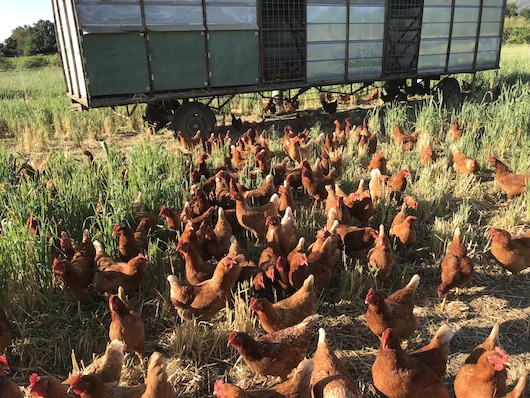
Happy chickens in their pasture.
–A short list of things to know about your farm–
1. All six of the farm’s owners live on the farm. This is great because they are around to do miscellaneous after hours chores and keep an eye on things. In the spring they can close greenhouses on Sunday night. In the summer they can turn off irrigation water in the evening. In the Fall they can unload an early morning delivery. In the Winter they are on frost watch and can turn on water to protect plants if the temperature dips too low.
2. The farm has a year-round crew and tries to keep people employed for the whole year. The main way that this is achieved is by growing a diversity of crops in every season of the year rather than specializing in just a few crops. Having a year round job in agriculture is important because the wages aren’t enough to support a family if the job only lasts for a few months.
3. Full Belly Farm has been certified organic since 1985. A lot of the soil on the farm has been managed organically since then. Managing the soil for long-term sustainability is reflected in healthier and more nutritious crops! Full Belly is one of a small group of organic farms that has been involved in building the organic market since it started in California.
4. Six kids grew up on the farm. Three of them are currently working on it, two of them are going to college and one of them is an elementary school teacher! A whole crew of grandkids are now GROWING up on the farm!
5. The farm generally harvests crops to fill specific orders. Or vice versa, we pick everything that is ready and work hard to make sure that all of it is sold the same day (that’s kind-of how our asparagus works.) This means that the majority of what we pack in the CSA boxes or take to the market was picked 24-hours before it lands in a kitchen. Of course there are exceptions: Winter squash and walnuts are stored in our cooler after their Fall harvest. Sometimes potatoes and cabbage are stored for a few weeks after we harvest them at their peak. This effort at Full Belly, to pick and sell things on a quick turn-around requires a lot of management, but it means that quality stays high.
6. The farm has an internship program that currently includes six young people who are here to learn about organic agriculture. The interns live on the farm, go to farmers markets, do animal chores, and work in as many varied positions as possible. Our Marketing Director and our Harvest Manager were once interns here and our Field Manager is married to an ex-intern. Several people who were once interns at the farm live nearby, and other ex-interns have started their own farms – one right up the road – and others in lots of different states, for example (to name a few) Alaska, Minnesota, New Mexico, Oklahoma and New York…
7. The farm has a lot of solar panels. Our earliest installations are on the roof of our packing shed. Later we built a mechanics shop because we needed something to hold up more panels (well that was one of the reasons that we built it!) With additions here and there, the total of those systems is 60 kW/year. More recently, we installed solar to run the pump for our new 12-acre almond orchard (about 30 kW). This system is not tied into the electrical grid at all. When we start harvesting the almonds from that orchard the almond butter will be ‘solar powered.’ Now another 61 kW solar system is in the works, funded in part by a grant from the California Energy Commission. This system will power some of the irrigation pumps that we use.

8. There are a lot of farm-organized activities that take place here besides growing and selling our crops, for example farm tours, classes, classroom visits, pizza nights, farm dinners, and the Hoes Down Harvest Festival (October 5th this year). Knowing that there are fewer people all the time that live in rural communities and stay close to agriculture (especially in California), we want to share the farm with our community.
In our CSA program we have a healthy proportion of people who have been getting our boxes for years and who may have visited the farm and even had a chance to get to know it well. But there is also constant turnover — some members leave us and others join. This short list of things to know about the farm, are part of what make it a special place. Everyone living on the farm would come up with a different list.
—Judith Redmond
